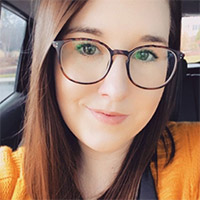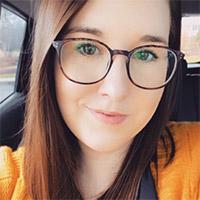"It is amazing what a woman can do if only she ignores what men tell her she can’t." — Carol K. Carr
It’s no secret that there’s a gender gap in technology. While the wage gap is languidly closing between male and female computer programmers, it looms large as an indicator that there is still work to be done. According to Girls Who Code, by 2027, only 22 percent of computer scientists will be women – that’s a drop from 24 percent in 2017 and 37 percent in 1995. Reversing this trend comes down to acknowledging it and encouraging young women to look beyond what society tells them they’re meant to pursue in life.
As more schools integrate programming and coding course requirements early on, it’s vital that young women can clearly see their seat at the table. So how do we prepare them for the fight they’ll inevitably face if they enter the world of programming, or introduce them to computer science altogether? By sharing the stories of women who came before them and understanding that some must build their own seats from scratch.
Take Mary Allen Wilkes for example, who fell into a computer programming job at the Massachusetts Institute of Technology in 1960. Mary was unsure of which direction to take her career after graduating from college and recalled that, by chance, her high school geography teacher had suggested she become a computer programmer. Mary didn’t even know what a computer was at that point, but after graduating from Wellesley College in 1959, she headed straight to MIT to inquire about computer programming jobs. Before long, Mary was a programming prodigy working on the IBM 704 and later the LINC computer, which is considered the first “personal computer” by many in the industry.
Mary’s story isn’t far off from how other women enter the world of computer science today. One of Veracode’s own employees, Lupita Carabes, was introduced to programming by happenstance and discovered firsthand just how large the gender gap in software engineering is. We asked Lupita to share her story for Women’s History Month in hopes that it will help inspire the next generation of girls and women to uncover otherwise unseen male-dominated career paths.
What is your role at Veracode and which roles have you held in Engineering in the past?
I’m currently an Application Security Account Executive at Veracode, though previously I was an Application Security Software Developer. I was also a firmware/software developer intern during my senior year for the connectivity team at HP, working with WiFi-Direct and BLE technologies. I was the only one with Android mobile app development experience on the team at the time and helped prototyped concepts that would normally be outsourced to a third-party application development firm to validate technical feasibility.
What did you study in school that brought you to a career path in Software Engineering?
I never knew Engineering was a career option until my senior year in high school. I was in AP Calculus 2, AP Physics, and AP Computer Science. I was naturally good at mathematics, so those subjects intrigued me more. English is my second language, so I found reading and writing more challenging. Through the Boys and Girls Club mentorship program, I was fortunate to attend LaSalle Catholic College Preparatory on a scholarship. I graduated with honors and earned first place in a competition for a full ride scholarship to the University of Portland, where I earned my degree in Electrical Engineering and a minor in Computer Science.
In what ways were you exposed to computer science growing up?
My parents have always been very entrepreneurial as a result of having to make their own way. They instilled core values that drove me to seek out opportunities. My dad ran his own local non-profit television show to educate the Latino community, so I spent a lot of time volunteering and it inspired me to learn about film and photography. I joined a program that helped me save money to buy my own camera; for every dollar I put in they put in two through a local bank. Then, my dad took out a loan and we started a wedding/special occasion video and photography business.
I loved the arts. Before discovering my capabilities in the mathematical world, I applied and was admitted to a very competitive arts magnet school, Da Vinci Arts. During my time there, I kept skipping math levels and I was encouraged to explore that talent. I ended up transferring back to my local neighborhood school in the 8th grade and competed for a full ride to the private Catholic Prep.
The same program I was admitted to also provided the opportunity to compete for a full ride to college upon graduation. While I excelled at math and loved the Arts, not having the reading and writing skills necessary to stand out amongst my peers meant that I needed to think of ways to be financially independent in case I couldn’t afford college.
That’s how I signed up for a web development course. I wanted to create a website to market my family’s photography and video services at a greater scale. There was a mix-up with enrollment, and I ended up in AP Computer Science 101 instead. The rest is history.
What are a few of the biggest reasons you feel a lot of young girls and women don’t decide to follow a career path in computer science?
I think it comes down to the lack of role models. I had no idea that my love for mathematics would lead me down this path. I knew I could never be a nurse; I couldn’t spell or correctly pronounce half the words in biology. I knew about occupations like teacher, lawyer, etc. but I read too slowly, writing wasn’t my forte, and I was very shy. The list could go on. I didn’t see women around me in programming careers, so it never occurred to me that I could branch out beyond other common roles. I think this is a problem a lot of young women face.
"Each time a woman stands up for herself, without knowing it possibly, without claiming it, she stands up for all women." — Maya Angelou
We’ve seen that there is a gender gap between front-end and back-end developer roles. Why do you think that is, and what are some ways you think we can close those gaps?
It comes back to the stigma of left brain vs. right brain. Creativity vs. logic. Front-end is “visual and easy,” while back-end is “complex and too difficult.” The stigma around gender roles in technology is clear in most cases: there’s an assumption that women should take on the “easier” creative and visual roles, while men should take on the complex and “difficult” roles. I think we can close these gaps by sharing more stories like mine. The first coders were women. As a society, we have made progress, but we have a long way to go.
How can male developers become allies for female developers in the workplace?
My personality has evolved significantly over the years, but Engineers typically spend more time thinking than talking (at least I did before I gained the confidence to speak up). This environment makes it difficult to collaborate. So, often it’s hard to show off your strengths or work on your weaknesses. I think collaboration solutions like Slack lessen the anxiety a bit because they open the lines of communication. Male or female, it’s important to understand differences and be open to learning more about each other as people. That’s how we break down walls and close gender gaps.
What is some of the best advice that former managers have given you? Were there times when former managers could have given you better career guidance or support?
My career path has taken some interesting turns, but it all kind of makes sense when you look at the bigger picture. The best advice I’ve received is to seek out mentors. I’ve had some instrumental people in my life that have guided me through my journey. I could’ve been better supported when I went against the grain and challenged social norms. I’ve had people tell me to do as I am told, speak less, not admit when I don’t know something, and so on. To me, that is very counterproductive for any work environment, let alone for women in a male-dominated industry.
Can you talk about how Veracode handles these issues, from your experience?
Veracode does a wonderful job putting female role models in leadership positions, which in turn translates into a culture that inspires women to seek new heights in their careers. I’ve said it before, and I’ll say it again. When I grow up, I want to be Sam King.
Veracode’s culture has allowed me to cultivate every aspect of my brand in this industry. I’ve never felt so confident and empowered. Never in a million years did I think I would be working with million-dollar companies, providing consultative advice to C-level executives and Engineers with accolades and patents galore, helping secure their software. The girl who didn’t even know what software was is now seen as someone with a demonstrated history of working in this space. I couldn’t be more grateful!
"Step out of the history that is holding you back. Step into the new story you are willing to create.” — Oprah Winfrey
Stay tuned for more blog posts in this series as we explore the gender gap many female developers face, and discuss how we, as a community, can reverse the trend.




